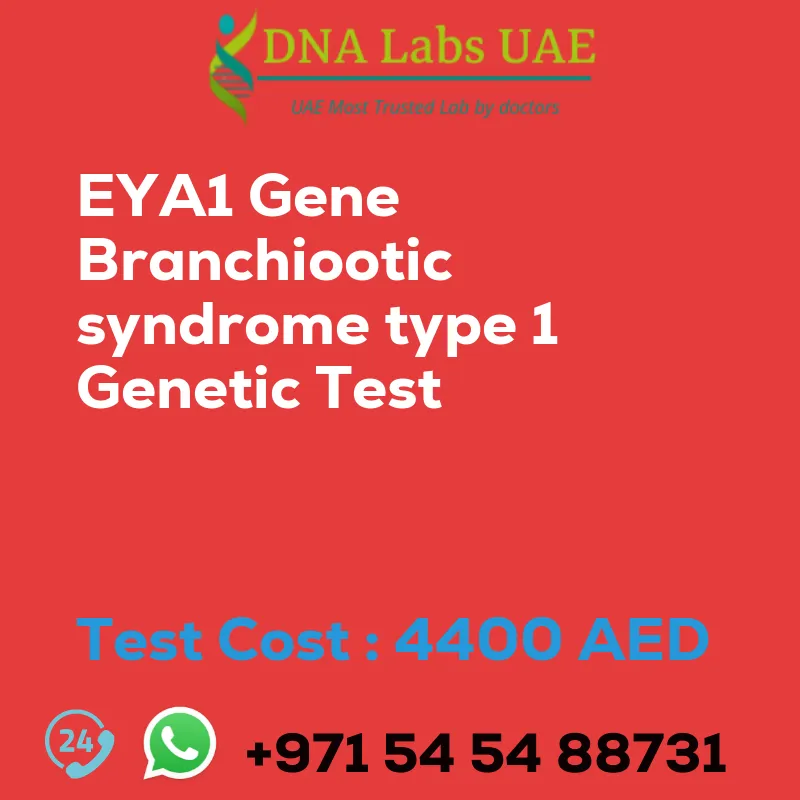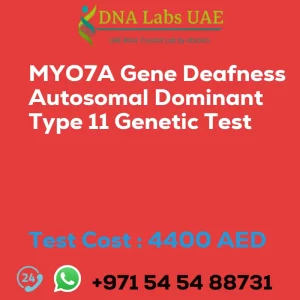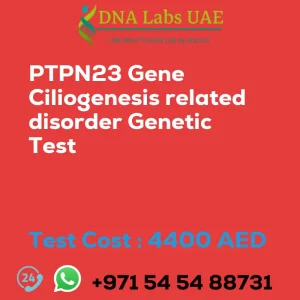EYA1 Gene Branchiootic Syndrome Type 1 Genetic Test
At DNA Labs UAE, we offer the EYA1 Gene Branchiootic Syndrome Type 1 Genetic Test at a cost of AED 4400.0. This test is designed to diagnose and detect abnormalities associated with Branchiootic syndrome type 1 (BOS1), also known as Branchiootorenal syndrome type 1.
Test Components
- Price: 4400.0 AED
- Sample Condition: Blood or Extracted DNA or One drop Blood on FTA Card
- Report Delivery: 3 to 4 Weeks
- Method: NGS Technology
- Test Type: Ear Nose Throat Disorders
- Doctor: ENT Doctor
- Test Department: Genetics
Pre Test Information
Prior to undergoing the EYA1 Gene Branchiootic Syndrome Type 1 Genetic Test, it is important to provide the clinical history of the patient. Additionally, a genetic counseling session may be conducted to draw a pedigree chart of family members affected with the EYA1 Gene Branchiootic Syndrome Type 1 NGS Genetic DNA Test gene EYA1.
Test Details
The EYA1 gene is associated with Branchiootic syndrome type 1 (BOS1), a rare genetic disorder characterized by abnormalities in the development of the ears, kidneys, and neck. Our NGS (Next-Generation Sequencing) genetic testing method allows for the simultaneous analysis of multiple genes to identify genetic variations or mutations related to specific disorders or conditions.
For the diagnosis of BOS1, the NGS genetic testing is specifically used to identify mutations or variations in the EYA1 gene that may be causing the syndrome. This involves sequencing the DNA of an individual to identify any changes or variations in specific genes. The results of this test can confirm the diagnosis and provide valuable information about the specific genetic changes involved.
NGS genetic testing not only aids in the diagnosis of genetic disorders, but it also provides information about the risk of developing certain conditions or the potential response to certain treatments. If there is a suspicion of BOS1, our healthcare provider may recommend NGS genetic testing to analyze the EYA1 gene and identify any potential mutations or variations that may be causing the syndrome.
Ultimately, the results of the EYA1 Gene Branchiootic Syndrome Type 1 Genetic Test can assist in confirming the diagnosis, providing information for genetic counseling, and aiding in treatment planning.
| Test Name | EYA1 Gene Branchiootic syndrome type 1 Genetic Test |
|---|---|
| Components | |
| Price | 4400.0 AED |
| Sample Condition | Blood or Extracted DNA or One drop Blood on FTA Card |
| Report Delivery | 3 to 4 Weeks |
| Method | NGS Technology |
| Test type | Ear Nose Throat Disorders |
| Doctor | ENT Doctor |
| Test Department: | Genetics |
| Pre Test Information | Clinical History of Patient who is going for EYA1 Gene Branchiootic syndrome type 1 NGS Genetic DNA Test. A Genetic Counselling session to draw a pedigree chart of family members affected with EYA1 Gene Branchiootic syndrome type 1 NGS Genetic DNA Test gene EYA1 |
| Test Details |
The EYA1 gene is associated with Branchiootic syndrome type 1 (BOS1), also known as Branchiootorenal syndrome type 1. BOS1 is a rare genetic disorder characterized by abnormalities in the development of the ears, kidneys, and neck. NGS (Next-Generation Sequencing) genetic testing is a method used to analyze multiple genes simultaneously to identify genetic variations or mutations that may be associated with a specific disorder or condition. In the case of BOS1, NGS genetic testing can be used to identify mutations or variations in the EYA1 gene that may be causing the syndrome. NGS testing involves sequencing the DNA of an individual to identify any changes or variations in specific genes. This can help in the diagnosis of genetic disorders and provide information about the risk of developing certain conditions or the potential response to certain treatments. If a person is suspected to have BOS1, a healthcare provider may recommend NGS genetic testing to analyze the EYA1 gene and identify any potential mutations or variations that may be causing the syndrome. The results of the test can help confirm the diagnosis and provide information about the specific genetic changes involved, which can be useful for genetic counseling and treatment planning. |








